Syed Aun Abbas Bokhari, the deputy director of NR3C (FIA’s Cyber Crime Wing), and Bolo Bhi reps Farieha Aziz and Hija Kamran, conducted separate sessions at the Teacher’s and Children’s Literature Festivals which were held from October 1 to October 3 at the Lok Virsa Museum, Islamabad.
Below is a summary of the tips provided during the sessions on digital safety.

- – Your laptop/computer should always be password protected
- – Regularly change your passwords
- – Always run antivirus software on your laptop; ideally you should check your computer for viruses on a daily basis
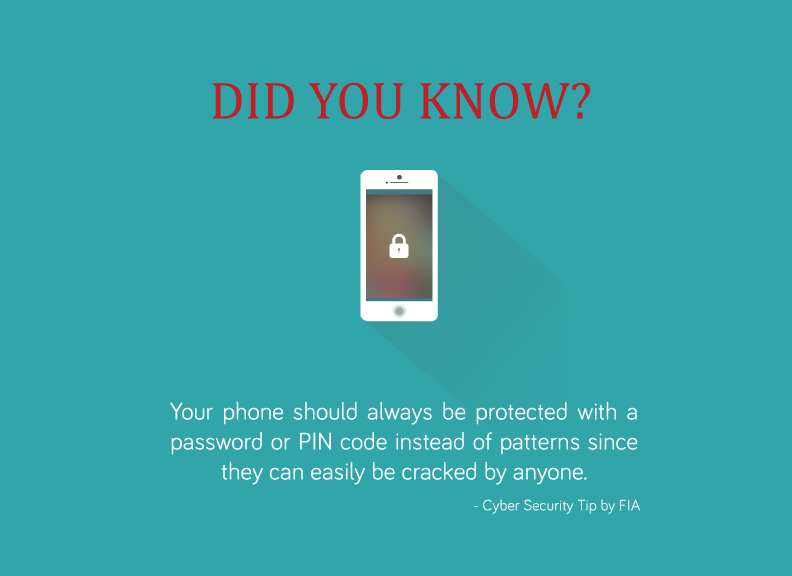
- – When downloading an app, look at the permissions it requires to access your phone
- – Never answer a call from any unknown number
- – Never agree to share your information with anyone calling from an unknown number; they may use your information to harm you later
- – Never agree to pay any amount in return for a prize

- – Never click on an unknown link on any website
- – Never download a file from a website that seems suspect or bogus
- – Always look for a green lock on the address bar or https:// in the URL
- – Always make sure you don’t have any unnecessary plugins installed; when you download something from an unauthorized website for free, they usually ‘expect’ something from you in return — be it a toolbar or a plugin which they try to sneak into your download
- – Clear your history and cache regularly

- – Change your default WIFI username and password — standard protocol for all devices/connections
- – The password should be complex; it should contain alphabets, numbers and characters, and should be case sensitive
- – Always avoid giving your WIFI password to someone you don’t know well. Create a guest account for visitors. Every internet connection has a unique IP address. If someone commits a crime while connected to your internet connection, the first thing that will be traced is the IP address and you can be arrested, and your computer/laptop/cell phone or any device using your internet connection can be confiscated as evidence
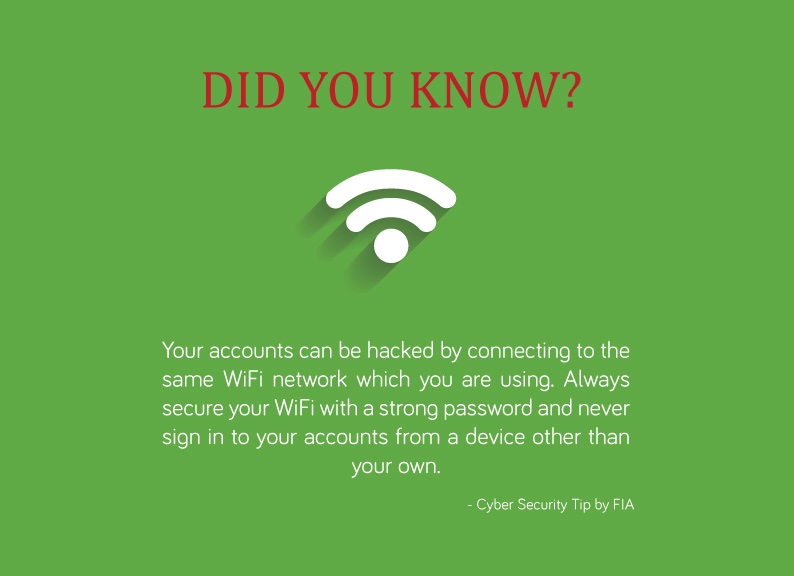
Turn off your WIFI when not in use

- – Don’t share your images publicly on social media. Pictures can easily be copied for identity theft or to be morphed on explicit images
- – Your password should be a combination of alphabets, numbers and characters, and should be case sensitive
- – Your password should never be your name; your birthday, friend/family member’s name or birthday, phone number; anything that can easily be guessed or identified with you should never be your password
- – Never share your password with anyone or write it down anywhere. The person you’re sharing with may be your friend now, but there’s no guarantee she or he will not abuse your data
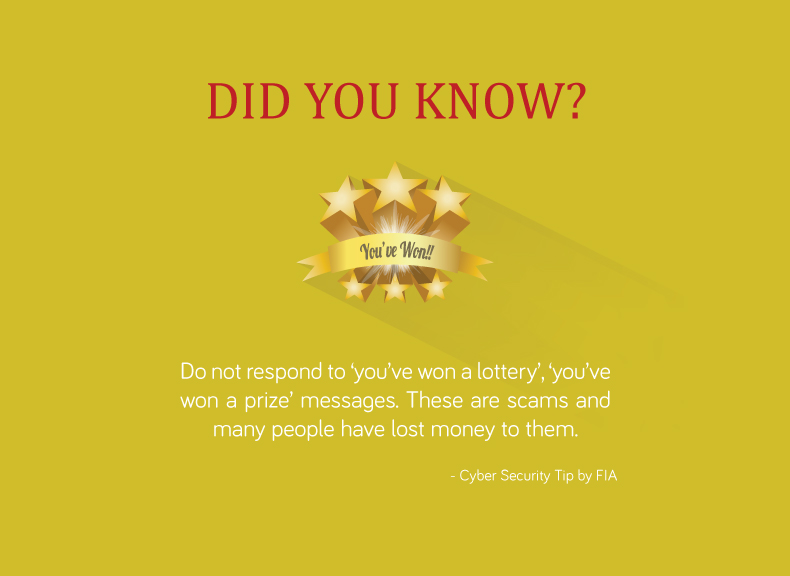
- – Never click on a link you receive in an email from someone you don’t trust. There’s a high chance the link contains a virus that can harm your computer or compromise your account
- – Never leave your social media account privacy setting on public. Only the people you know should see what you’re posting and sharing
- – Never add anyone you don’t know on Facebook and never respond to their messages
- – Always make sure you do not put anything on devices or social media accounts what you don’t want others to see; ‘only me’ settings and delete doesn’t mean it’s limited or gone. There are ways of retrieving the data or risk of it being accessed by others
- – Never use the same PIN codes for multiple account
- – Never share your bank details or personal information with anyone
- – Your bank will never send you an email asking you to enter online banking information on a form attached with the email. If you receive any such email, don’t enter your details as this maybe someone who plans on taking your information to steal money. Call your bank and confirm if they have sent any email and let them know someone trying to use the bank’s identity
- – Never let any shopkeeper take your credit card out of your sight. If they tell you the machine is not working and they need to go to the next shop to swipe it, there’s a possibility they might copy your card information and make a copy of your card.
- – Enable online banking when you require it; it reduces the risk of your card being misused by others

- – While using the ATM machine, make sure you check the card slot for any external device before putting your card in. If the green light is not visible on the slot, it’s possible someone has attached a card reader on the ATM to collect your card’s data. Since these cards use the same film that once used to be in cassettes, it’s really easily and cheap to copy data from it and use it
- – Always make sure the keypad of the ATM machine is not bulgy or raised. Criminals have started putting their own keypad underneath the machine’s keypad to steal PIN codes. In addition to stealing your card information and PIN, they can then steal money from your account
- – Always use one hand to shield the keypad while entering your PIN in the ATM machine. The camera is generally right at the top of the machine and your PIN could be visible through the camera
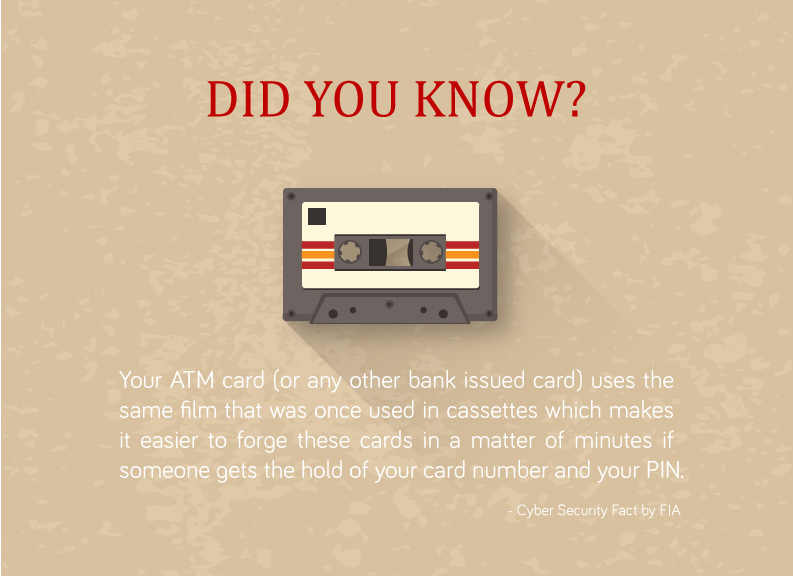
Bokhari urged the participants to report cases by calling the FIA helpline at 1199, or by visiting their website www.nr3c.gov.pk and lodging a complaint through an online complaint form.

Bolo Bhi wants you to remember one important fact:
“Everything that you put online stays online, even if you delete it on your end”
Post wisely and responsibly.
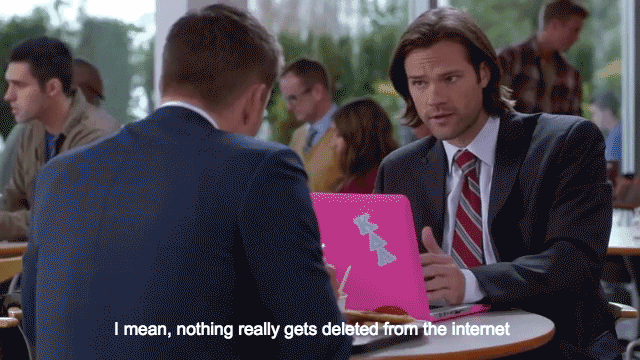
Supernatural



